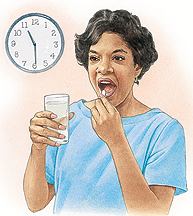Treating Pneumonia
Pneumonia always requires prompt medical care. The sooner you start treatment, the sooner you're likely to get better. Sometimes a hospital stay is needed. But many people can be treated at home. Even if you begin to feel better, be sure to keep following your doctor's instructions. Take prescribed medications exactly as directed. And be patient with yourself. It will take a long time for your energy level to come back. If you don't get enough rest, the infection may return.

Antibiotics
Early treatment with antibiotics can stop the infection and cure pneumonia caused by bacteria. These medications can sometimes cause side effects, including stomach upset. Tell your doctor if you've had side effects in the past. Also mention if you take other medications. To be sure to get rid of all the infection, keep taking your antibiotic prescription until it's gone, even if you feel better. Follow these tips:
-
Fill your prescription and start taking your medication right away.
-
Avoid missing or doubling up on doses.
-
Take your dose at the same time each day until the prescription is gone. Don't stop taking it, even if you feel better.
-
Use a pillbox if you have problems remembering to take your medication.
-
Let your doctor know if you have side effects. Your doctor may need to change your antibiotic prescription if you have problems with side effects.
-
Take your medication exactly as directed on the label. Talk to your pharmacist if you have any questions.
For Symptom Relief
Certain medications that can help relieve symptoms are available over the counter (without a prescription). Acetaminophen (Tylenol) and other pain-relieving medications can ease chest pain due to coughing. You may also be told to take cough syrup with an expectorant to loosen mucus and a suppressant to silence a cough. Don't take any of these medications without talking to your doctor or pharmacist first. Your doctor may want you to cough to clear mucus out of your lungs.
Special Treatments
In the hospital, you may be given certain treatments to help you recover. These treatments may continue at home. They may include:
-
Inhaled medications to open your airways.
-
Oxygen to help make breathing easier for you.
-
Methods to loosen and drain excess mucus from your lungs. This may include postural drainage (lying with your chest lower than your abdomen) or using a hand-held positive expiratory pressure (PEP) device.
Drink Fluids and Eat Healthy
Fluids help thin and loosen mucus. Ask your doctor whether you should increase your fluid intake. If so, drink at least 6-8 glasses of fluids a day. Water and juice are best. Making healthy food choices, including fruits and vegetables, gives your body the strength to fight infection. If you don't feel hungry, try to eat small meals or healthy snacks throughout the day, rather than three big meals.
Learn the Best Way to Cough
Your healthcare provider may teach you a way to cough effectively. This process can help you cough up mucus.
-
Sit in a chair with both feet on the floor. Fold one arm across your abdomen.
-
Take a slow, deep breath in through your nose. Lean forward slightly.
-
Cough 2 short, sharp coughs into a tissue. As you cough, gently push your arm against your abdomen. (You can also hold a pillow against your abdomen.)
-
Relax for a moment. Then take in another slow, deep breath and repeat.
Get Plenty of Rest
No matter how much better you feel, you need plenty of rest. Pace yourself. Be patient. It may take weeks to months to get your energy back. It's normal to feel tired and regain strength slowly. Talk to your doctor about when you can resume your normal activities.
Wash Your Hands Often
To prevent pneumonia from spreading to others, practice good hygiene. Germs are spread on hands, so wash your hands after being exposed to sources of germs. These include public places (such as stores), children, or sick people. Rub your hands with soap and water for 20-30 seconds. Clean between your fingers and around your nails. Dry your hands completely with a clean cloth or paper towel.
When to Call the Doctor
If you follow your treatment plan, you should begin to feel better within 48-72 hours. Call your doctor if you notice any of the following:
-
Symptoms suddenly get worse
-
Fever rises or returns
-
Shortness of breath worsens
-
Mucus becomes more discolored or increases in volume
-
Coughing becomes more severe
-
Lips and fingertips turn blue (this shows a lack of oxygen)
-
You have side effects from your medication
 I wish there was a way for everyone to experience that quality of medicine.
I wish there was a way for everyone to experience that quality of medicine.